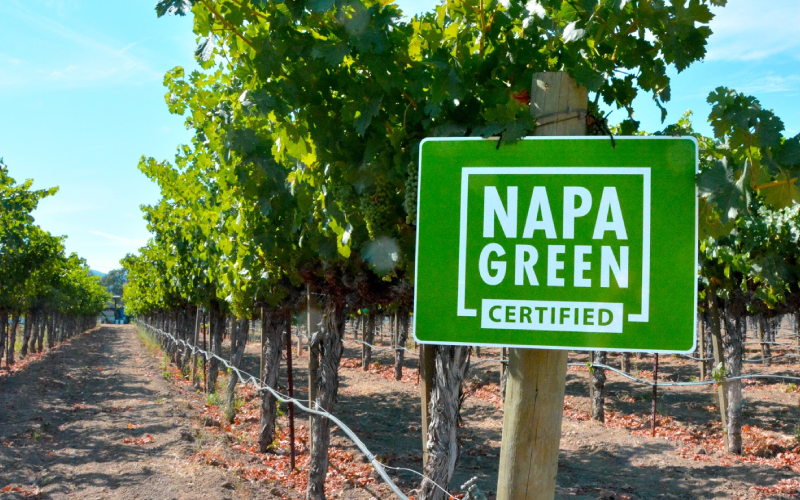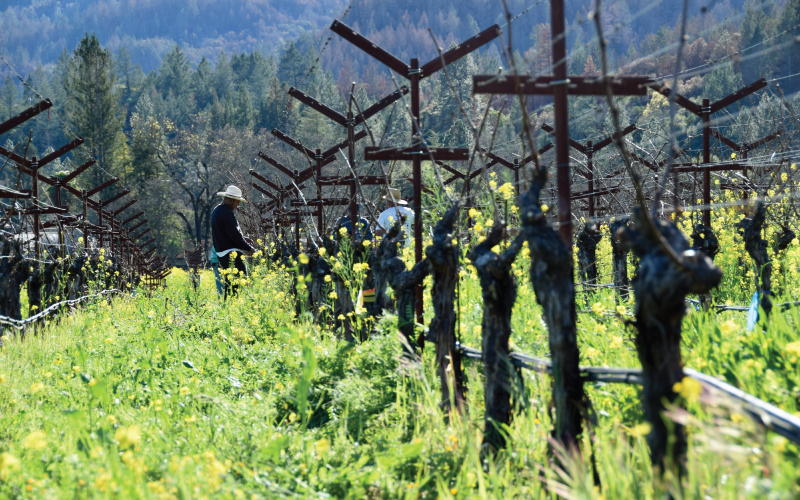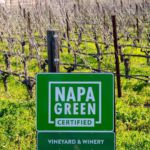Forty companies from across the globe joined forces this year to create the Sustainable Wine Roundtable, where stakeholders will work to set industry-wide sustainability standards and communication. Three of these founding members have Napa locations — Amorim Cork, Napa Green and Treasury Wine Estates — each with different perspectives and priorities to bring to the (round)table.

Napa Green is one of the three founding members with Napa headquarters, and will thus be advocating for local interests at the international level.

A Napa Green certified vineyard with cover crop between each row.
Napa businesses join international Sustainable Wine Roundtable as founding members
- Napa Valley Register | Sam Jones |
- October 4, 2021
By sharing best practices, advocating for incentivization programs, funding research and collaborating on certification processes, the SWR hopes to use the wine industry’s unique platform to mitigate the impacts of climate change.
“All of us, the wine industry included, have our work cut out for us if we want to keep our world a livable place in the face of a changing climate, loss of biodiversity, plastic in the environment or any other number of things that need tackling,” said Will Drayton, Director of Technical Viticulture, Sustainability and Research for Treasury Wine Estates. “One of the key roles of the SWR, apart from crafting industry solutions, is to do a better job of telling the public what the wine industry is doing.”
With certifications and programs targeting sustainability initiatives across the industry, the wine world is doing a lot — they just haven’t been advertising it as well as they had hoped.
“The wine aisle can still be a confusing place, and in the U.S. we have many different flavors of sustainability certification that can add to that challenge,” said Drayton. “It should be easy for the consumer to understand what they are buying and what the stamp on the back of the bottle means.”
Drayton applauds Napa area programs like “Certified California” and “Fish Friendly Farming,” but says he would love to see a “common framework” emerge among them.
“[One] that takes into account all the regional diversity of sustainability programs, while making it easy for the consumer to know that they can trust our wine meets their high standards and values in sustainability,” he said.
The SWR’s first annual general meeting won’t take place until the second quarter of 2022, but the organization has been and will be plenty busy until then. In addition to discussing existing sustainability standards, the group also will need to break into different priority topic groups, increase membership and land on a governance model.
For Napa’s founding members, that means pinpointing the issues important to the industry here in Napa Valley.
“The wine industry is not a monolith,” said Drayton. “We need to talk from our experience in Napa to help everyone understand the challenges and opportunities we’ve had here and how they can be used around the world.”
For example — last year’s fires.
“[That] stands out as a particular challenge for Napa Valley,” he said. “How we pull together to keep people safe, stay nimble and keep making great wines.”
For the cork industry, there have also been challenges new and old, including Twilight Zone-y rainstorms and generational concerns over long-term land ethic. Amorim Cork, a Portuguese company with a branch in Napa, is one of the SWR founding members bringing this specific angle to the conversation.
“We didn’t become sustainable a couple years ago because we needed to,” said Amorim’s Carlos de Jesus, “We celebrated 150 years last year, and we have known for 150 years that sustainability was absolutely necessary for one very simple, straightforward reason: Without sustainability there is no cork forests … Period.”
De Jesus explained how the wine industry and all of its subsidiary industries are perfectly positioned to tell their sustainability story, since those who work with the land day-in and day-out have been experiencing and adapting to climate change impacts for quite some time. In addition, wine also has the marketability needed to grab the attention of its consumers.
“Unlike other products, wine has a front-row seat in interfacing with the consumer,” he said. “Wine is an agricultural product, but it is branded … It is an aspirational product, and it doesn’t have to be a luxury product, but it often is, and it is certainly more and more about the denomination of origin — that creates a great platform for leadership in climate change.”
With this platform, de Jesus wants to not only show the world why cork and wine production can be sustainable practices, but that changes can be made to avoid achieving this at the cost of others.
“If there is one fallacy that is fundamental that we debunk, it is that you can never balance people, profit and crop,” he said. “It’s not easy, I know, but to call that a utopia is to prevent the world from finding solutions to the problem … The wine industry has the ability to show the world that it can be done [and] it is as difficult to achieve as it is necessary.”
In Napa, where the wine industry permeates across hotels and hospitality, this is particularly important. 40% of all of the certified sustainable wineries in California are in Napa County, and programs like Napa Green have worked tremendously hard to retain the landscape that residents find so appealing. So through this global platform, players like de Jesus, Drayton and the leading forces behind Napa Green can advocate for the valley and its inhabitants.
“The SWR is going to enable us to lighten our footprint, help keep the rural character of places like Napa Valley, strengthen our resilience against climate change, keep preserving our environment around us, [and] it also provides a forum for looking at equitable labor standards and human rights,” said Drayton.
“And if you don’t live in Napa but enjoy a glass of Stags’ Leap, you should care that we’re going to be finding ways to lift sustainability standards and make them clear to you as consumers so that you can make conscious decisions about what you buy for yourself and the planet.”
These founding members are looking forward to sharing their innovations and initiatives with the public. While climate change outcomes have become more dire as global temperatures climb each year, the wine industry has the opportunity to make this a celebratory shift, rather than a crisis-driven one.
“If you did a poll around the entire world and asked people what are the top five happiest sounds of all time, I bet you that the pop of a cork coming out of the bottle would be one,” said de Jesus. “It doesn’t matter what age or gender or which continent you are in, that is a carrier of good news.”
Making the commitment to third party certification takes time and effort, but it is worth it to demonstrate our commitment to the community and to protect our watershed, our land and the air we breathe.
- Susan Boswell, Chateau Boswell Winery


